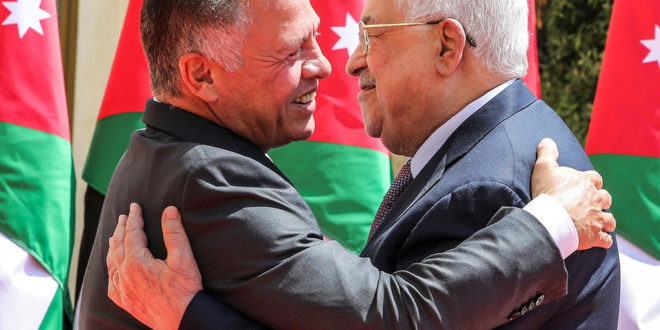Shehab Al Makahleh
There are political, cultural and economic conflicts mushrooming in the Middle East and North Africa (MENA) region. Such wars should be collectively addressed. In 2014, the Jordanian monarch King Abdullah II said that the Middle East would not enjoy security and stability without an accepted fulfilling solution to the Palestinian-Israeli conflict. In 2018, this has proved true. The Middle East remains the utmost threat to international peace and security.
When the financial crisis hit the world in 2018, mainly affecting Middle East economies, this has resulted in higher rates of unemployment and lack of opportunities for the youth who have become desperate due to dearth of job openings. Some Arab countries have been fretful about the standstill in the major regional conflict that would help terrorism and extremism to thrive if no breakthrough in the peace talks between both Palestinians and Israelis is reached anytime soon.
Americans believe in peace by “pieces”
Since 1978, Americans propagated their peace plan between Arabs and Israelis through pieces. The first phase was to remove Egypt from the Arab front against Israel by neutralising the Egyptian army in the Camp David Peace Pact. The second phase was to neutralise Jordan in 1994 which has the longest borders with Israel. The third phase was in 1995 when the Palestinian National Authority signed the Oslo Peace Agreement with Israel, defusing many years of war between both parties. The fourth was to engage leading Arab armies in wars to weaken them: Syria and Iraq through internal conflicts.
Peace tide changed from pieces to free peace
Since Americans do believe in a gradual peace process between Arabs and Israelis to ensure security and safety of their close allies in Tel Aviv, peace talks have entered the “peace on the cheap process” with hurdles and hindrances that should be settled due to the squeaky wheel inclination.
The Middle East conflict has been complicated since 1967 which has prompted the key players to dismantle the whole process into pieces. However, this has not worked so far. As long as all proposals do not address the key issues including the refugees, land for peace and East Jerusalem, any talk about a lasting peace will be in otiose. Any political compromises or any ultimatum deals cannot achieve progress in the Palestinian-Israeli conflict as this needs the parties directly involved to directly grease the squeaky wheels of the standstill peace talks.
Interdependent solutions and symbiotic factors
The main factors of Palestinian -Israeli encounter cannot be disentangled because the way-out will ineludibly be as mutually dependent as the core reasons of the problems are.
In 2017, the Jordanian monarch said that the Americans have a major role to play in the Palestinian-Israeli conflict; this means that Americans can grease these wheels using their diplomacy. No one can deny that the Americans have a strong say on Israeli and Arab politicians to jump-start the peace initiative of 2002 anytime, but peace cannot be a take-way recipe tailored as per American and Israeli ambitions and dreams. Any peace deal should emanate from the people but supported and facilitated by governments.
Rapprochement between Israel and Arabs
The Arab wold collective position was in 2002 based on Arab Peace Initiative which can be the foundation for a lasting peace. At that time, Arabs had taken a strategic choice to achieve a peace deal without jumping over the Palestinian cause. Arabs by then decided on the right of Palestinians to live in freedom but only after Israelis and Palestinians sit to discuss all pending issues, which will result in a Palestinian state fulfilling their dreams and ambitions. The Jordanian government supports a lasting peace that is accepted by the people, and who would benefit from this state of stability and security in a better future that guarantees more opportunities to meet their potentials.
Have Americans taken Jordanian-Palestinian interests?
Jordan believes that peace is a concerted effort of many players. Thus, no country can do it alone to achieve peace and prosperity because our globe needs to build bridges of pluralism, acceptance and coexistence. This explains why the Middle East is deemed so far a reason of challenges to politician. Challenges start from the Palestinian-Israeli conflict, to conflicts in Libya, Yemen, Syria and Iraq and other dormant predicaments in North Africa, in Sudan, Somalia, and elsewhere. On the other hand, the Mideast region is rich in opportunities due to the population which is estimated at 360 million, with more than 75 per cent are less than 30 years old who seek to realise their potentials. Yet, as long as there are various types of conflicts: political cultural and economic, MENA will not enjoy peace and stability at all.
The two-state solution and the holistic approach
The Palestinian-Israeli conflict is not religious or economic; it is a conflict over rights. If the war this time breaks out, the toll of this conflict will be enormous. Jordan and some other Arab states believe that only the two state-solution can help resolve several decade conflict.
The no-solution process leads to frustration among Arabs and Palestinians as this digs radicalism roots deep because people have started to lose hope and have become desperate. Such radicals would one day be terrorists who propagate their agendas on governments.
If Daesh has been defeated in Syria, Iraq and in other countries of the MENA, this does not mean they are destroyed as political, cultural and economic conflicts in the Mideast would yield to worse versions of terrorists. In other words, should the Palestinian-Israeli conflict not be resolved, radicalism will rocket and terrorism will thrive. Thus, this is not an issue to the MENA alone, but rather to the international community to grapple with.
Arabs do believe in a strategic holistic approach to address radicalism and terrorism in terms of geography because if such terrorist factions are defeated in one country, they would thrive in another. Also, it is of utmost importance to solve conflicts and solve them by addressing war lawlessness, on which terrorism thrive, lack of opportunities and to counter terrorists’ narrative by exposing their fallacies and canards.
Home grown radicalism is a major challenge to many countries in the region. Jordan cannot mitigate extremism unless the issue of Palestinians is resolved, and the Syrian war is over because the lack of such an atmosphere would create a milieu for further radicalism.
 Geostrategic Media Political Commentary, Analysis, Security, Defense
Geostrategic Media Political Commentary, Analysis, Security, Defense





